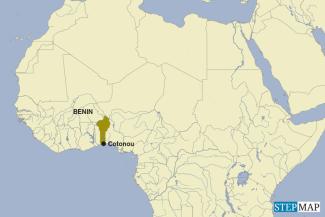Child labour
Facing an uncertain future
 stepmap.de
stepmap.de
The children work regardless of weather conditions, under a scorching sun and during torrential rains. Their employers are market stall owners, who use the children to expand their selling range into the streets. Some of the children, often unkempt and clad in rags, are so desperate to sell their wares that they approach car drivers as soon as they slow down to search for a parking space.
Child labour in Benin takes many other forms as well. Some children work as household servants, cleaning, washing dishes and laundry and accompanying homeowners’ young children to kindergarten. Others work in the construction industry or in carpentry or mechanical repair shops. They carry out tasks meant for adults, using tools and materials that are often too heavy and too dangerous for children to handle.
Employing children for low wages and in tasks inappropriate for their age is nothing new in Benin. It is an outgrowth of poverty. The children usually hail from remote bush villages such as Agbanta in the Ouémé region or Za-Kpota in the Zou region, which tend to have high birthrates and low family incomes.
Parents who cannot care for their children essentially rent them out to wealthier people in cities for as little as 40,000 CFA Francs (about €62) per year. The employers usually promise to pay the parents a fixed monthly sum, but they seldom keep their word. The urban employers usually also promise to feed and clothe these children and provide a formal education. But often these are empty promises. And very few parents are able to follow up to see what happens to their children after this transaction is completed. Indeed, as time passes, some irresponsible parents even forget that they had rented out or sold their children.
Some of the children who have been rescued by police told their stories recently on national television, in a programme produced several years ago and rebroadcast. The purpose was to keep raising awareness of children’s predicament. Viewers could see and hear abused and exploited children complain of severe pains in their necks due to carrying heavy loads on their heads. Some also told of pains in the knees and feet.
The unlucky ones were beaten by their custodians when they were unable to sell enough wares. The television footage showed festering sores and lacerations on their backs and bottoms. Psychic damage was also in evidence, as some of the young victims of abuse and exploitation had obvious difficulties speaking.
A growing number of non-governmental organisations (NGOs) and opinion leaders are now lobbying for tougher laws and more active law enforcement to end all forms of child labour. Under Benin’s penal code, child exploitation is punishable by up to five years’ imprisonment and abuse is punishable by longer sentences.
When officials focus on the issue they get results, at least for a short while. For example, in a spurt of enforcement in 2017-2018, Benin’s child protection agency freed hundreds of exploited children. Today the agency faces the further challenge of stopping the trafficking of children from Benin to plantations in Côte d’Ivoire, Nigeria or Gabon.
To have a long-lasting impact, enforcement should be regular rather than sporadic. Without a concerted effort to stop this abuse and exploitation, Benin’s children face an uncertain future.
Karim Okanla is a media scholar and freelance author based in Benin.
karimokanla@yahoo.com
